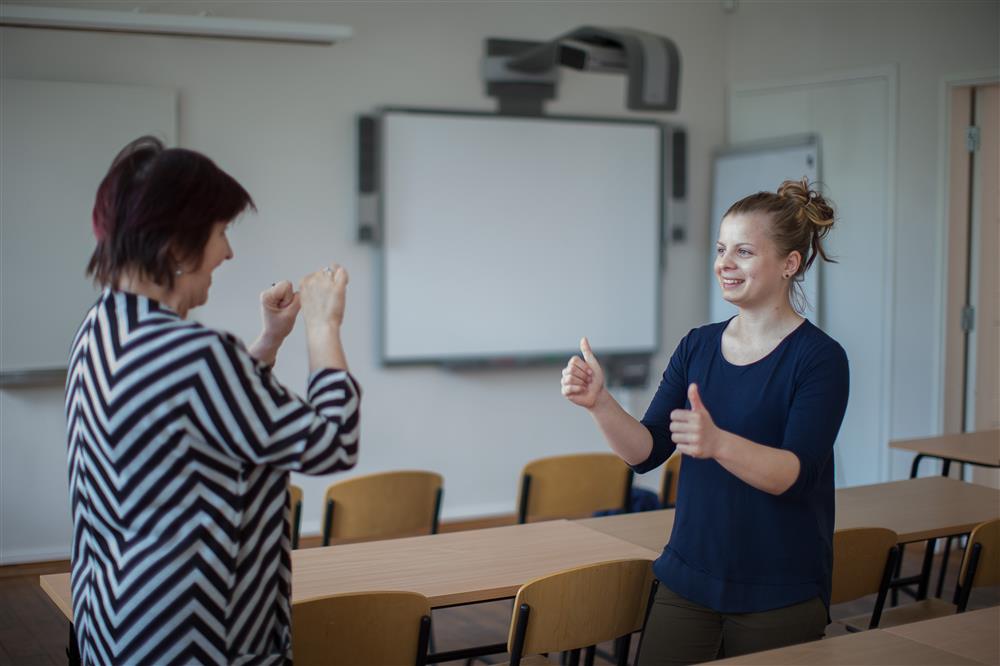Access to higher education in Estonia
- Solution
- Primus Programme, 2008-2015 by the Ministry of Education and Research, Archimedes Foundation and partners, Estonia
- Organization
- Estonian Ministry of Education, Higher Education Department
- Country of Implementation
- Estonia
- Region
- Europe
- Subregion
- Central and Eastern Europe
- In cooperation with
- Archimedes Foundation
- First published
- 31.01.2016

Solution details
People
“It’s difficult to put into words the beam in the eyes of people with disabilities who have found dignity, purpose, and independence in academic and personal achievements at a university they thought was not accessible to them.” Sven Kõllamets, Counsellor for Students with Special Needs, TUT University
Prior to the Primus Programme, skills in teaching and supporting students with disabilities were poor in Estonian universities. There were no disability counsellors, no scholarships, not enough technical tools, and little general awareness. A paradigm shift was initiated when in Estonia’s Higher Education Strategy (2006–2015) prioritized access to higher education for learners with special needs, and in 2008 the Primus Programme was launched. All higher education institutions, as well as organizations of persons with disabilities and student unions, have participated in the strategy’s development. A working group developed and proposed disability-related solutions (scholarship conditions, etc.). As a result of higher education reforms and with the help of funding from the European Social Fund, Estonia launched its Primus Programme, which was implemented from 2008 to 2015. The programme offered stipends and support schemes for students with special needs, arranged training sessions and seminars for freshmen, and developed student support services through a network of study and career counsellors. Since the end of the programme many of its measures continue to be implemented by the Ministry of Education and Research.
Problems Targeted
By providing training for entrants, study and career counselling, and scholarships, Estonia’s Primus Programme has successfully acted as a real door-opener for numerous students with disabilities. The programme was funded by the European Social Fund and ended in 2015, but many measures continue to be implemented.
Solution, Innovation and Impact
Estonia’s Primus Programme for Higher Education Quality Enhancement was a national non-legally binding policy, financed by the European Social Fund and the state budget, and implemented by the Archimedes Foundation. Among others, Primus arranged training sessions and seminars for freshmen with special needs, cooperated through a network of study and career counsellors to develop support services, and supported students with special needs with stipends and support schemes. Students with special needs could apply for scholarships covering regular support services (e.g., personal assistants) or for one-time grants. Primus expanded the range of students with special needs who received support while also involving students in providing services to students with special needs. Each partner informed the Archimedes Foundation of all learners with special needs, and on the basis of the data collected the management council approved the services to be provided. Universal design Thanks to technical solutions and the mapping of obstacles, universal design was implemented in many universities. Additional costs related to the accommodation of students with disability were reduced thanks to available scholarships. _x000D_ Innovation Audio learning materials and audio books were newly developed for students with visual impairments. _x000D__x000D_Counselling and support Awareness was raised among counsellors regarding the special needs of students with disabilities. For instance, Tallinn University of Technology offered peer support by a qualified (former) disabled student. Other universities (e.g., University of Tartu) merged the functions of tutors and support staff. A student reported that in his university the number of students with disabilities increased from 20 to 200. In 2011, the Estonian Union for Persons with Mobility Impairment awarded the Primus Programme with their annual “Aasta tegu” (Deed of the Year) Award. The scholarships for students with special needs are now funded by the Ministry of Education and Research, as of Act No. 178 of 2013. New policies for 2016–2021 will also pay attention to such special needs as autism, dyslexia, etc.
Funding, Outlook and Transferability
The Primus Programme is transferable to other countries wishing to enhance the performance and inclusiveness of their higher education institutions. Its total budget for 2008−2015 was €16.4 million, 95% of which came from the European Social Fund. The largest expenses were teacher training (€3.9 million) and student stipends (€1.9 million).
Media
Life Story
THE STORY OF SVEN KÕLLAMETS
“They find dignity and a sense of purpose”
I have been working as a counsellor for students with special needs since 2010. I see on a daily basis how many of my students now continue to university, because they have noticed that others have been able to succeed in that environment. It is a wonderful feeling to see the beam in their eyes thanks to their newly found dignity, sense of purpose, and independence when they realize that an academic life at a university is truly accessible to them. At awareness-raising events, I have met students, cloakroom staff, and even cleaning ladies who have come to me to say how great it is that there are so many students with disabilities studying at Tallinn University of Technology (TUT) I have seen students with neck injuries able to study alone, to live in dorms, and to put on clothes with the help of a motorized bed. They are happy, independent, and capable of pursuing their futures and careers as valuable members of society. I suppose one has to have lived in a post-Soviet state to realise how remarkable it is that in such few years both the older and the younger generation have seen and welcomed so many changes as part of their everyday life. By providing funding to people with disabilities and by giving them a push to try something that had previously been considered unthinkable and too expensive, the Primus programme has achieved a lot: greater awareness, accessibility, and joy for people with disabilities.
Related information
- Connections
- 2
-
Organization
- People